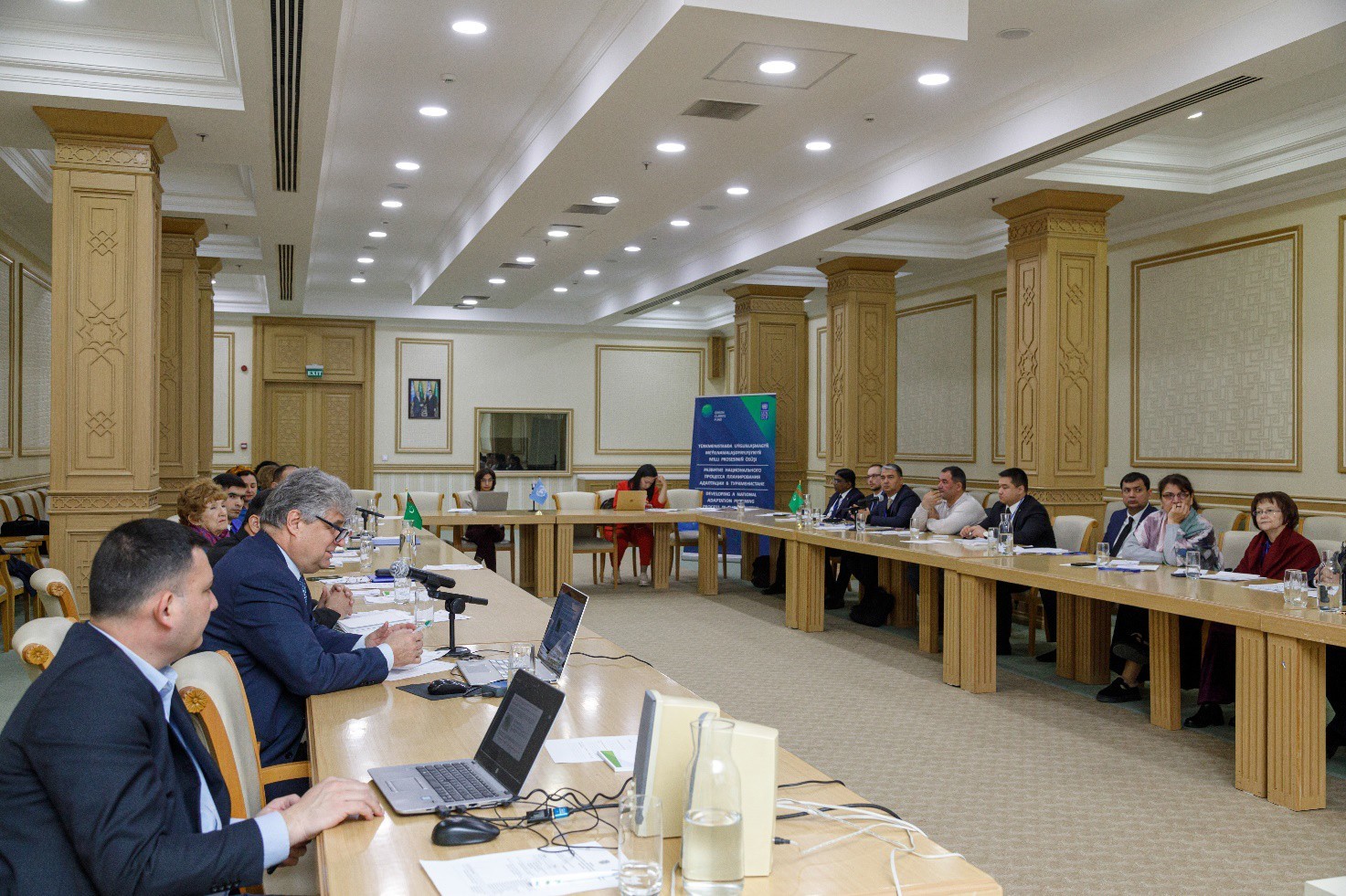The series of workshops aimed to promote cooperation and strengthen partnerships between the government, private sector and civil society and identify strategic ways to increase Turkmenistan’s resilience to climate challenges were organized within the UNDP/GCF NAP project.
About 85 representatives from government agencies, the private sector, academia and civil society organizations attended the workshops.
The invited experts from Uzbekistan and Turkmenistan exchanged the vision and experience on the ways to climate change adaptation.
The first workshop "Practice and prospects of intersectoral cooperation on climate change adaptation for urban areas" was held on January 23, 2025, in Ashgabat.
The participants discussed the following presentations by the invited experts:
- "Climate change and the main risks for urban areas" by Dr. Vadim Sokolov, UNDP International Expert, Head of IFAS Project Implementation Agency in Uzbekistan, Vice-President of the International Commission on Irrigation and Drainage;
- "Risks and Preparedness for Emergencies Caused by Natural Disasters in Turkmenistan" by Mr. Rustam Astanov, Main Directorate of Civil Defense and Rescue Works of the Ministry of Defense of Turkmenistan;
- “On the activities of the Ministry of Health and Medical Industry of Turkmenistan in the context of adaptation to climate change” by Ms. Guzaliya Gazizova, Center for Public Health and Nutrition of the Ministry of Health and Medical Industry of Turkmenistan, State Sanitary and Epidemiological Service;
- “Opportunities for Turkmenistan's business companies in the field of compliance with ICAO (International Civil Aviation Organization) environmental requirements” by Ms. Gulyalek Erjanova, Leading Ecologist of Turkmenistan Airlines;
- “International experience in using environmental technologies in civil aviation” by Ms. Lachin Dadekova, leading environmental inspector of the Turkmen Hova Yollary agency;
- "Alternative Fiber and Renewable Energy" by Mr. Rovshen Aydogdyev, Toprak Company Manager;
- "Education as a catalyst for climate progress: UNICEF strengthens the capacity of the education system in Turkmenistan" by Ms.Valeria Danilchenko, UNICEF, Disaster Risk Reduction Specialist;
- "Activities of national environmental public organizations of Turkmenistan in the field of adaptation to climate change for urban areas" by Mr. Merdan Arazmedov, Nature Conservation Society of Turkmenistan;
- "Experience of participation of non-profit organizations of Turkmenistan in grant programs financed by international donors" by Ms.Mahym Mamedtacheva, Head of the NGO "Ynamly durmush";
- "Activities and experience of expert non-profit organizations of Turkmenistan in the field of providing access to technical publications on adaptation to climate change for urban areas" by Ms. Guljamal Nurmukhammedova, head of the analytical agency "Ynanch-Vepa";
- “The website “SREDA.UZ” as a mechanism for information exchange on issues of grant programs to support environmental NGOs in Uzbekistan” by Ms. Natalia Shulepina, international expert of the UNDP project.
The second seminar “New Opportunities for Business in the Field of Climate Change, Education, Information Exchange and Technology Transfer” was held on January 29, 2025 in the UN Conference Hall in Ashgabat.
The analytical agency "Ynanch-Vepa" head Ms. Guldzhamal Nurmukhammedova made a presentation "What professions will be most in demand in the future?".
Participants were invited to discuss educational issues on ecology and climate change. The participants emphasized that, given the seriousness of global challenges and the speed of climate change in the region, the time has come to begin a national interdepartmental dialogue with the business and public organizations to develop industry programs for the systematic training and retraining of personnel.
The third workshop "Practice and prospects of inter-sectoral cooperation in climate change adaptation for agricultural areas" was held on February 6, 2025, in Ashgabat.
Participants discussed cross-sectoral cooperation on climate change adaptation for agricultural areas of Turkmenistan and reaffirmed their commitment to cooperation. The findings will be taken into account in future climate policies and initiatives.
These workshops served as a platform for facilitating and driving cooperation and action to build climate resilience.

